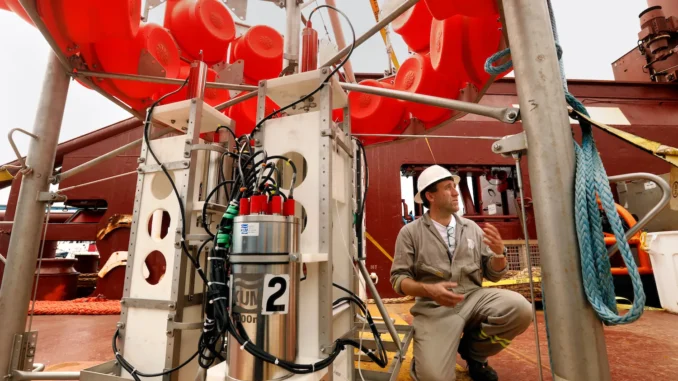
The scramble for critical minerals is heating up under the sea, but lawmakers fear the United States could be left behind.
As the United States hunts for critical minerals—the materials underpinning vital technologies ranging from electric vehicle batteries to advanced weapons systems—an increasing number of U.S. lawmakers from both major parties are urging the Biden administration to take its search under the sea.
The seafloor is home to an untapped bounty of mineral-rich formations that mining proponents are eager to exploit—and soon. It’s a highly controversial idea that has sparked pushback from hundreds of scientists, governments, and big automakers. But the proponents’ arguments have resonated with some lawmakers in Washington, where concerns over China’s critical mineral supply chain dominance are pervasive, and the Biden administration has been desperate to slash U.S. dependence on Beijing.
“There is a growing interest in deep-sea mining for the simple reason that they hope it would cut reliance on China,” said Tom Moerenhout, an expert at Columbia University’s Center on Global Energy Policy.
The U.S. lawmakers’ turn to deep-sea mining is part of Washington’s broader effort to secure alternative critical mineral supply chains and minimize potential vulnerabilities that Beijing could take advantage of. China commands the processing and refining of many of these minerals and metals—including powerful rare earth elements—a dominance that it has previously leveraged to hit back against other powers.
Yet even as U.S. interest grows, there’s a major catch: No such deep-sea mining industry exists, and key questions of technical and economic viability loom over prospective operations.
On the regulatory side, commercial mining operations have been prohibited in international waters until the International Seabed Authority (ISA), the governing body established by the U.N. Convention on the Law of the Sea, writes a mining code for the nascent industry—an ongoing process that has been complicated by a raft of tangled compliance, environmental, and financial questions.
And even if commercial mining operations do begin in international waters, Washington—which never ratified the 1982 Law of the Sea Treaty over concerns that it would face too many deep-sea mining restrictions—can’t take part in the scramble. Companies that want to mine in international waters have to secure a state sponsor before applying for a mining license. Since the United States isn’t a party to the treaty, it can’t sponsor license applications.
The issue flared in debates at the ISA’s latest negotiations, running from March 18 to March 29, when both China and Russia argued that the United States’ lack of ratification nullified its claims to an extended stretch of the seabed, the Financial Times reported. The U.S. delegation pushed back, but not being a member, it only has observer status and thus less power.
The fact that the United States is not a party to the treaty “just means that we don’t participate at all,” said Alex Gilbert, a researcher at the Colorado School of the Mines. “It doesn’t mean that we participate on our terms, it just means that we’re excluded.”
Washington is facing pressure to change its position. Last November, U.S. Sens. Mazie Hirono, Lisa Murkowski, and Tim Kaine reintroduced a resolution urging the U.S. Senate to ratify the Law of the Sea Treaty. Hirono and Kaine are Democrats; Murkowski is a Republican. And earlier in March, nearly 350 former diplomats, officials, and military leaders, including former U.S. Secretary of State Hillary Clinton, signed a letter to the Senate Committee on Foreign Relations in which they echoed the senators’ calls.
“We have already lost two of our four ‘USA’ designated deep seabed mine sites,” which contain “minerals critical both for United States security dominance as well as the transition to a greener twenty-first Century,” the signers wrote. They added that “[c]ontinued inaction on the Treaty means a likely quick loss of our remaining two ‘USA’ designated sites,” while China and Russia have obtained more sites.
One day after the letter was released, Republican Reps. Carol Miller of West Virginia and John Joyce of Pennsylvania introduced a bill in the House, known as the “Responsible Use of Seafloor Resources Act,” that would task the Commerce Department and White House Office of Science and Technology Policy with producing reports on legislation related to seafloor mining as well as an analysis on the benefits of importing the seafloor’s resources and then domestically processing them.
“The United States should not be beholden to China for critical minerals,” Miller said in a statement accompanying the bill. “The Responsible Use of Seafloor Resources Act will significantly reduce supply chain vulnerabilities and bolster American manufacturing and jobs, while combatting Chinese production of critical minerals.”
The flurry of efforts comes months after a group of 31 Republican lawmakers, led by Reps. Elise Stefanik and Rob Wittman, wrote a letter in December urging U.S. Defense Secretary Lloyd Austin to consider deep-sea mining as a “new vector of competition with China” as part of the Defense Department’s mandate to make national defense supply chains more resilient. The Pentagon has been working on a report assessing the United States’ domestic processing ability for the deep-sea mining nodules.
These moves also come as the Metals Company, a Canadian firm that has become one of the most aggressive proponents of deep-sea mining, has also sought U.S. government funding for a processing or refining facility. “America doesn’t have any of those existing plants that could process our nodules,” CEO Gerard Barron told Axios.
But even as U.S. lawmakers race ahead, the future of a potential industry remains shrouded in uncertainty. Beyond questions of environmental risks, industry experts have questioned the technical and financial viability of launching commercial mining operations in such an unforgiving underwater environment.
“There’s a huge amount of uncertainty around the financial aspect,” said Moerenhout, the Columbia University expert. “This is a completely different business from conventional mining; it’s going to be very expensive.”
That uncertainty, combined with other regulatory and environmental questions, could throw a wrench in U.S. lawmakers’ deep-sea ambitions.
“I don’t see it as a given that the U.S., as a government, is going to move in this direction, particularly because of the risks involved—scientifically speaking, environmentally speaking, but also reputational risk,” said Pradeep Singh, an expert on ocean governance at the Research Institute for Sustainability at Helmholtz-Center Potsdam, who attended this month’s meeting of the ISA Council.
“It’s quite clear that we are not ready for deep-seabed mining, and it would still take some years to close all the gaps and get us to a point where we have sufficient information to decide on whether or not it’s a viable option,” he said.



